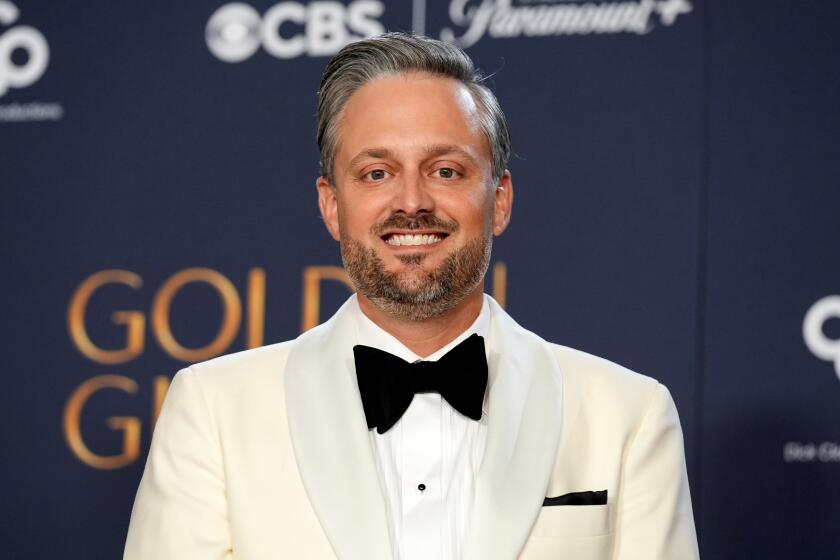A case for an Emmy (or more) for ‘Foyle’s War’
- Share via
Many claimed to be shocked at last year’s Emmys when PBS’ “Sherlock” swept most of the best miniseries or movie categories, winning for lead actor, supporting actor and writing, in addition to many craft awards. But the only truly surprising thing was the surprise itself. From the moment it premiered, “Sherlock” made the Best Show Ever lists of critics and fans alike. “Sherlock” is exquisite, significant storytelling and deserved recognition.
You know what other similarly constructed British show fits that description? “Foyle’s War.”
Created and written almost entirely by bestselling novelist Anthony Horowitz, “Foyle’s War” is the Mona Lisa of television: small, quiet, utterly hypnotic and mysteriously perfect.
And finally, thanks to the intervention of streaming service Acorn TV, which specializes in British programming, “Foyle’s War” made its U.S. debut this year (with PBS picking it up locally in syndication this month), making it an official Emmy contender and giving voters their first, and last, chance to honor one of the best shows of the century.
So, ladies and gentlemen of the Television Academy, please do your duty.
For more than 10 years and eight seasons, the adventures of Det. Chief Supt. Christopher Foyle (Michael Kitchen) have drawn universal praise from critics and deep devotion from the audience. Set initially in a small southern coastal town during World War II and then London during the years following, “Foyle’s War” is a historical epic disguised as a British detective series.
A veteran of the First World War assigned to fight the second on the homefront, DCS Foyle, along with his irrepressible young driver, Sam (Honeysuckle Weeks), and stoic Det. Sgt. Paul Milner (Anthony Howell), took on villainy in many forms, including murder, blackmail, looting, racism and germ warfare.
ITV Studios, which produced the show, canceled it after the fifth season, forcing Horowitz to discard stories from the middle war years (weep with me for the lost scripts of “Foyle’s War”) so his characters could go out celebrating the war’s end. But the discerning public demanded more, and so Foyle returned, transitioning to peacetime before reluctantly joining MI5. (Sam came along, though not Milner.)
A small and often silent man, as kind as he is morally rigorous, Foyle stands guard over basic humanity as the whirlwind of war and modernity threatens to uproot the good with the bad. Year after year, he has been brought to vivid vibrant life by Kitchen, an actor of rare and controlled brilliance. Each season, he gave the performance of a hundred lifetimes while appearing to do little more than shrug off his coat, bite his lip and refuse endless offers of tea.
Composer John Adams and artist Agnes Martin are all well and good, but if you want to understand the power and importance of Minimalism, watch Michael Kitchen in “Foyle’s War.”
In contrast, Weeks took Sam from sweetly comic relief to the more sober embodiment of postwar reality. Married to a new MP, Sam’s life reflected the realities of a struggling economy and the frustration many women, now forced to choose between career and family, began to feel.
All while thwarting crime and conspiracy of an increasingly modern nature — the final episodes dealt with nationalism, terrorism, the tyranny of oil interests and the realization that war crimes are never limited to one side of any conflict. Horowitz, who continues to produce bestselling novels, including most recently “Moriarty,” drew his stories from actual history and his attention to detail and nuance is surpassed only by his devotion to character and the spare beauty of his writing.
Last year, ITV once again pulled the plug, and the final episode of the series, “Elise,” is what the American-based Acorn TV, which has co-produced the series since its return, will submit in all the relevant television movie categories — some of which it better win, despite the low-key nature of its radiance and, perhaps more significant, the famous long-standing refusal of its leading man to do any publicity.
Neither should matter at all if the awards are truly about excellence.
Twitter: @marymacTV
ALSO:
Timeline: Emmy winners through the years
Video: Emmy contender live chats
More to Read
From the Oscars to the Emmys.
Get the Envelope newsletter for exclusive awards season coverage, behind-the-scenes stories from the Envelope podcast and columnist Glenn Whipp’s must-read analysis.
You may occasionally receive promotional content from the Los Angeles Times.








